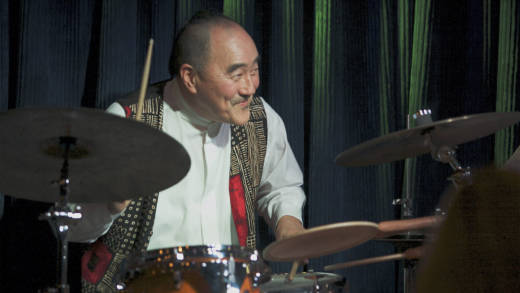Seasoned veteran is the best way to describe Tana, who spent two decades on the New York scene accompanying many of jazz’ greatest improvisers, including saxophonists Sonny Rollins, Stan Getz, James Moody, Zoot Sims, Jimmy Heath, Warne Marsh and Sonny Stitt. He established himself as a bandleader with TanaReid, a group he founded with Sacramento-raised bassist Rufus Reid. During the 1990s, the group toured internationally, released six CDs and boosted the profile of brilliant young players like saxophonists Ralph Moore and Mark Turner (a member of the SFJazz Collective from 2010-2012).
That same decade, Japan’s economy was in a massive bubble. Tana started producing albums for Tokyo-based King Records, which expanded his connections to a scene he’d gotten acquainted with as a touring player. “I’d put these sessions together pairing Japanese and American musicians,” he says. “I’ve never consciously pursued any kind of agenda forging relationships with Japanese musicians. It just kind of happened.”
The bridge that Tana has built has also taken him back over the Pacific with the singular ensemble Otonowa, a group focusing on a strikingly beautiful body of music interpreting traditional Japanese melodies through a modern jazz lens. Created in the aftermath of the 2011 earthquake and tsunami that devasted northeastern Japan, the concept first came together for a tsunami relief fundraiser at Fairfax’s Elsewhere Gallery in the summer of 2011. Featuring Bay Area bassist Noriyuki “Ken” Okada (who was born in New York and raised in São Paulo, Brazil and Yokohama, Japan) and Japanese-born San Francisco flutist-saxophonist Masaru Koga (who grew up moving between Europe and the United States), the trio played jazz arrangements of traditional Japanese songs, some dating back centuries.
Convinced they were onto something special, Otonawa ended up bringing the music to stricken communities in Japan the following year, performing “at temporary shopping centers and housing units,” Tana recalls. In 2013, San Jose-raised pianist Art Hirahara expanded the ensemble to a quartet and Tana documented the group on an eponymous album for his label, Cannatuna.
Otonowa isn’t the first group to turn Japanese songs into vehicles for jazz improvisation. Trumpeter Lee Morgan arranged the folk song “Desert Moonlight” on his hit 1965 Blue Note album The Rumproller, and saxophonist Benny Golson interpreted “Tombo” (or “Red Dragonfly”) by the great composer Kosaku Yamada with his New Jazztet in the early 1980s. Pianist, composer, orchestra leader and NEA Jazz Master Toshiko Akiyoshi spent much of her brilliant career finding inspiration in Japanese folk idioms. Otonowa takes a different approach, hewing closely to the sublime folk-derived melodies.
“Otonowa is kind of the reverse of the Osaka concerts,” Tana says. “We’re going over there, mostly Americans, and the material is all Japanese stuff that bridges the communication gap. They know all this music, which I didn’t until we did this.”
The music has continued to evolve, and while subsequent tragedies and disasters have pulled the world’s attention to other regions, Tana and Otonowa continue to raise funds for Japan’s northeastern Tohoku region. The group reunites for a series of concerts, performing at Palo Alto’s Mitchell Park Community Center (Oct. 6), Half Moon Bay’s Bach Dancing & Dynamite Society (Oct. 7) and Berkeley’s California Jazz Conservatory (Oct. 10), presented by Jazz in the Neighborhood.
In addition to Koga, Hirahara and Okada, the fall performances feature Bay Area koto master Shoko Hikage, San Francisco vocalist Saki Kono, and the young Japanese trumpeter Takehiro Dai, “who was separated from his family for two days after the tsunami,” Tana says.
“You realize what a healing force music can be,” he reflects, “and it reminded me of why we got into doing this stuff.”


